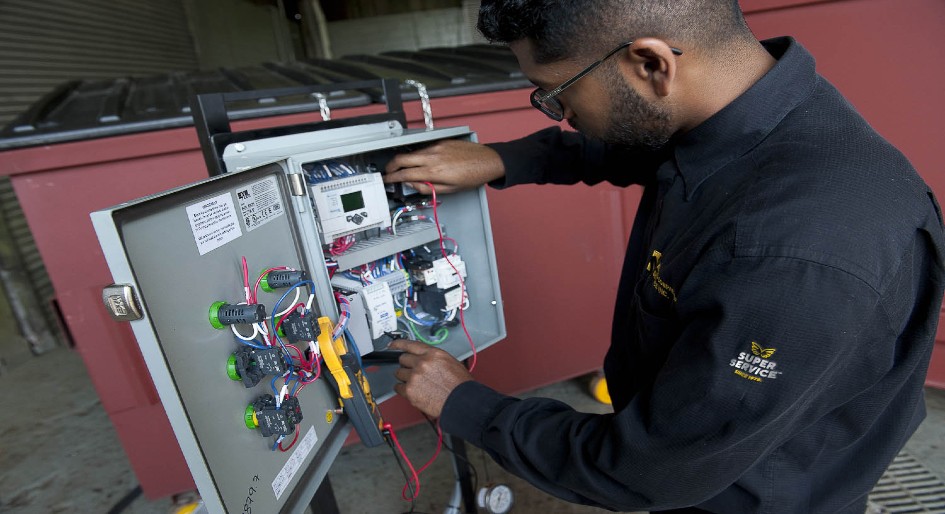2019 was a year where climate concern and action hit a critical mass with an entire generation. Greta Thunberg, a 16-year-old climate activist, tapped into the zeitgeist and helped rally millions worldwide. Meanwhile, young climate strikers urged the Canadian delegation at the United Nations Climate Change Conference to ‘act now.’
But where to start? As human rights activist Desmond Tutu once wisely said, “There is only one way to eat an elephant: one bite at a time.”
Despite the massive scale of the climate movement, it is smaller efforts focused on sustainability that are required to enact change. A good example is facility management.
Modern facilities are complex ecosystems with countless moving parts that must operate in harmony to work effectively. Concerns around sanitation, sustainability and efficiency are prompting the adoption of new processes.
Contemporary facility management involves a delicate balance of labour, materials, resources and technology. One piece of this puzzle is waste management, specifically waste equipment. Tasked with eliminating garbage from facilities, waste equipment services are increasingly using digital technology to optimize processes, reduce the volume of physical waste and help make facilities management operations more sustainable.
IoT Approach To Garbage
The Internet of Things (IoT) refers to a series of interconnected devices that use shared data to provide insights and increase efficiency. The rise of IoT over the past two decades has been significant, with a projected 25 billion connected devices by 2021. For waste equipment services, technology enables remote monitoring of equipment, which has numerous benefits for a sustainable business, including reduced frequency of maintenance and waste collection, and extended life cycle for equipment.
Facility managers across North America face some common challenges, and a wide variety of industry-specific ones as well. Retail facilities, for example, must manage highly varied, seasonal volumes and use patterns. Accordingly, they require equipment that uses data to optimize changing workloads. Facility managers in the restaurant and grocery space have the added strain of managing organic materials and their impact on the longevity of equipment.
The latest IoT-enabled waste equipment has the ability to provide insights into the condition and performance of compactors. It can identify issues remotely, often before they are detectable by other means, thereby avoiding unscheduled downtime and optimizing waste equipment performance. By effectively monitoring compactor and bin fullness, managers can decrease the number of bin pickups, ultimately reducing overall costs and carbon emissions.
IoT technology brings remote diagnostics to today’s waste equipment, allowing service providers to troubleshoot without ever being on-site. The ability to identify an issue before dispatching technicians eliminates some trips entirely and makes others shorter. This is a rare instance where costs and carbon emissions can be lowered in one stroke.
In Canada, extreme weather conditions and shifts in seasons are often a common cause of damage to equipment. In some cases, such as the freezing of hydraulic fluid, damage is immediately apparent. In others, like complications from the thermal expansion of equipment, faults are harder to detect, worsening over time and causing disruptions across the board. With historic data and trends collected with the use of IoT technology, it is possible to identify relatively small shifts early on and address any issues before they turn into an emergency.
Facility managers are facing sustainability mandates that are part of core business plans. In fact, facilities are often at the forefront of change and managers are having to constantly evolve with requirements to reduce negative effects on the environment, through reduced water and energy use, streamlined building systems and decreased negative effects of transportation. Technology must be an enabler in this regard, working alongside existing waste equipment, especially for smaller facilities where flexibility is essential.
These challenges faced by facility managers require a reimagined approach to service. Waste equipment and services that can process and organize vast amounts of data help inform sustainable practices throughout the facility. This is a powerful way to bring efficiency to facilities, encouraging sustainability to extend upward to the rest of the organization.
For facility managers and waste equipment, the bottom line is simple: less time and resources devoted to dealing with garbage leads to a reduction in the overall carbon footprint of waste management. That includes fewer trucks, fewer bins, less downtime and longer equipment life.
Danny Mauti is CEO and president of Metro Group, which includes Metro Compactor Service, a Canadian company focused on sales and service of waste and recycling equipment. Its new IoT-enabled compactor and bin technology, iSMART, helps customers reach their sustainability goals, minimize downtime and extend equipment life.








